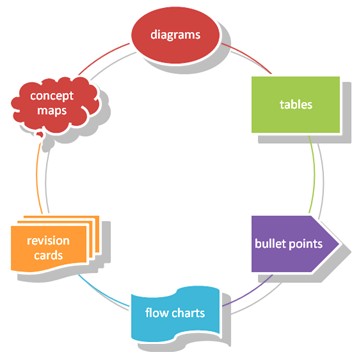Active Learning
Far too many pupils spend many hours revising and still get disappointing exam results. Why? The main ‘technique’ used is to read through a book several times, or copy notes out. These are not effective ways to remember things.
The mind gets switched off easily. It has to be engaged. Simply reading or copying allows the mind to switch off. A simple proof is to stop and shut the book. Now give yourself a blank piece of paper and write out as much as you can recall. The answer will probably be ‘very little’. That is because simply reading or copying is passive, the mind doesn’t have to do anything and switches to thinking about other, more interesting, things.
What is required is ‘active learning’. In active learning you engage the brain, requiring it to have to think. It means making you think about reprocessing the information. If you look at a good textbook you will see there are many ways to present information:

With active learning you take information presented in one form and turn it into another. This requires thinking - that requires concentration and engages the brain. The result is that you will remember much more of it.
Your Memory
It is important to understand that your memory has two forms – short term and long term. Short term memory is for all the things you need to remember for the next few hours but not for long. This applies to much of what we see, hear, read etc.

When revising you need to place the information in your longer term memory so you can recall it in an exam. Therefore you need to go over the information several days later. That way you can see how much has actually been stored in the long term memory, and therefore, how much is likely to be remembered in the exam.
The good thing is that you can train your mind. As you practice techniques you will get better at remembering and recalling facts. You will also get better at selecting the best method of learning for different types of facts and what suits you best.
Good active learning techniques result in much better learning and remembering. It also means that revision sessions should not go on for hours and hours. Short, intense sessions are best. If you are really learning then 30 – 40 minutes of intense, focused revision is enough. Then you stop and do something else to keep the mind fresh.
The best motto is ‘little and often’. Frequent short bursts of intense, concentrated effort works.
For further information and help:
Email: This email address is being protected from spambots. You need JavaScript enabled to view it.
Phone 07900 217093
